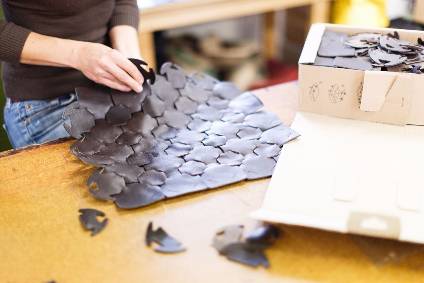
Luxury UK fashion group Burberry is looking to affect “real change” in the leather goods supply chain via a partnership with Elvis & Kresse that sees the latter use Burberry’s leather offcuts to reproduce homeware and accessories for sale.
A five-year partnership signed between The Burberry Foundation – the brand’s charity arm – and Elvis & Kresse – a high-end brand that creates lifestyle accessories using reclaimed materials – will see at least 120 tonnes worth of leather off-cuts from Burberry given a new lease of life.

Discover B2B Marketing That Performs
Combine business intelligence and editorial excellence to reach engaged professionals across 36 leading media platforms.
Half of the profits from the range will be donated to charitable causes focused on renewable energy and the remainder will be reinvested by Elvis & Kresse to expand their work in reducing and reusing waste, protecting the environment and inspiring craftspeople.
In a press release detailing the partnership, Elvis & Kresse said each year at least 800,000 tonnes of leather waste is produced by the global leather industry.
“By demonstrating what can be achieved when leather waste is revalued, and created into entirely new products, Elvis & Kresse and the Burberry Foundation aim to affect real change in the supply chain of the leather goods industry,” says the release. “Where leather waste is usually destroyed, the partnership with Elvis & Kresse will disrupt the accepted approaches and reveal new solutions”.
Christopher Bailey, a trustee of The Burberry Foundation and president and chief creative officer of Burberry Group, adds: “Leather is a precious material, yet many of the off-cuts generated by the design process are seen as worthless. We believe that this can change, and we are proud to lead the way in showing how creativity and craftsmanship can play a part in solving this issue.”

US Tariffs are shifting - will you react or anticipate?
Don’t let policy changes catch you off guard. Stay proactive with real-time data and expert analysis.
By GlobalDataLast week, Burberry joined a raft of textile, apparel and retail companies that pledged to support an increase in their use of recycled polyester by at least 25% by 2020.





